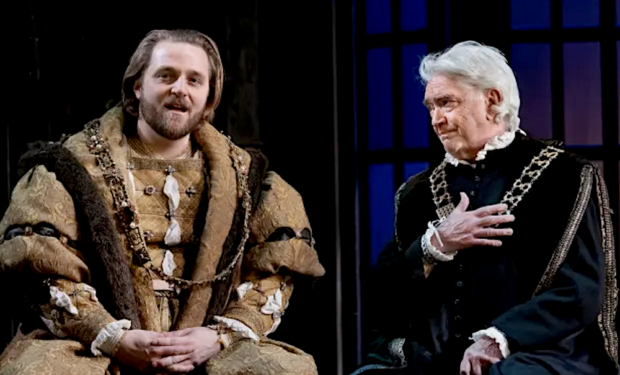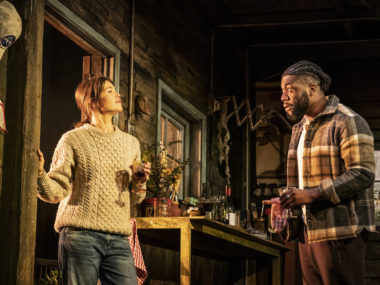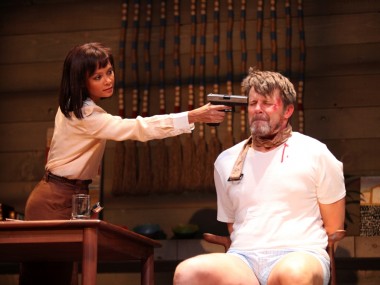A Man for All Seasons, Harold Pinter Theatre
Friday 15th August 2025

The Tudors are fascinating. From Wolf Hall to Six, from Hampton Court to royal ceremonies, they are a crucial part of our island story, and of our national identity. But how does Sir Thomas More fit in? After all, he was neither Protestant nor simply a man of conscience. In fact, he was contradictory: a religious fundamentalist who gleefully burnt heretics at the stake, and a bold speaker of truth to power. A solemn intellectual, and a bawdy teller of dirty stories. Was he, in the words of 16th-century chronicler Edward Hall, “a foolish wise man or a wise foolish man”? This mixture of characteristics exerts a powerful pull, even if Robert Bolt’s portrait of him as a Man for All Seasons has its own tendentious agenda. First staged in 1963, the play reflects the swinging decade’s anti-Establishment More, played once again by Martin Shaw, rather than the complex historical character.
In this version, the religious More, a scholar and statesman, objects to King Henry VIII’s plan to divorce Catherine of Aragon and marry Anne Boleyn. After a series of political meetings — with Cardinal Wolsey, with Thomas Cromwell, with the Duke of Norfolk, with Signor Chapuys, the Spanish ambassador to England, and with Henry himself, More uses his legal acumen to keep silent about his disapproval. At the same time, he promotes Richard Rich, an awkward young man who is looking for a political position, while we also get a glimpse of his home life: his wife Alice, who thinks he should cooperate with the King and their daughter, Margaret, who gets a proposal of marriage from William Roper, a lawyer who becomes an MP and eventually More’s biographer.
Things hot up when, in 1534, Parliament passes the Act of Supremacy, which establishes the Church of England and appoints Henry as its supreme head. As a conservative Roman Catholic, More cannot accept this because it signifies a break with the Pope and the Church of Rome, which traces its roots to Christ’s blessing of St Peter as his vicar on Earth. He keeps a diplomatic silence as Cromwell, with the help of the treacherous Rich, tries to convict him of bribery and then of treason for defying Henry by not taking an oath accepting the King’s supremacy and the justness of his divorce and remarriage. Despite the passionate urging of Alice and Margaret, More remains defiant and the play, surely no spoiler, ends with his imprisonment and execution.
The innovative thing about Bolt’s play is his inclusion of the Common Man, a kind of softly Brechtian narrator who reminds us that while the lords and masters are quarrelling over religion and matters of state, the ordinary folk carry on with their everyday lives. He also plays the roles of the other lower-class characters: More’s steward Matthew, the boatman, the publican, the jailer, the jury foreman and the executioner. Bolt explains in his preface to the play that he intends the Common Man to personify attitudes which are common to everyone, but he also puns on the sense of “common” as vulgar, and this gives a welcome touch of comedy to the drama. In contrast to More, these men are also shown as having much more flexible consciences.
When More is sentenced to death, he finally articulates his disagreement with the act of Supremacy, and criticises a government that will kill a man for his silence. Bolt subtly explores the contradiction between his moral rectitude and his attempts to find legal loopholes and ethical ambiguities. More strongly opposes Henry’s divorce, yet he hopes to avoid speaking out. He is also shown as a man struggling with his beliefs and ideas, explaining to Roper, “God’s my god, but I find him rather too subtle.” If in the end he accepts the sacrifice of his life, comparing himself to Christ, he is also rather brutal to those, like Alice and Margaret, who want him to compromise and live. There is a ugly strain of fanaticism that contrasts with his noble attempt to resist state power.
So the main dilemma of the play is the question of what can anyone who believes in religious truth do when the head of state changes their beliefs? This lifts the play from its Tudor context, and gives it a universal sense of urgency in an era when our rulers often break secular laws as well as spiritual ones. Despite this resonance, Jonathan Church’s Bath Theatre Royal touring production, designed by Simon Higlett, is resolutely based in literal history, with wood panelling and richly jewelled costumes exuding a feeling of Wolf Hall rebooted. There is no attempt at reimagining the scenarios. On the other hand, the story is told clearly and with a good pace, the scenes seemlessly merging into each other and a large cast delivering solid performances.
That said, Shaw — who is familiar from television parts which include the title roles in Judge John Deed and Inspector George Gently — does take time to warm up. At first he comes across as quite tentative, then as lovingly protective of Alice and Margaret, then as often irritated by folly, then as the sharp intellectual lawyer splitting hairs, and finally strong in his beliefs and his conscience, climaxing in a great roar of defiance. In comparison to this multifaceted portrayal, the rest of the cast are more one note. Still, my favourites are Gary Wilmot’s comedic and sympathetic Common Man, Orlando James’s energetic and mercurial Heny, and Edward Bennett’s menacing Cromwell. Both Abigail Cruttenden (Alice) and Annie Kingsnorth (Margaret) deliver rushes of energy whenever they appear. This is a solidly traditional piece of popular theatre.
© Aleks Sierz




